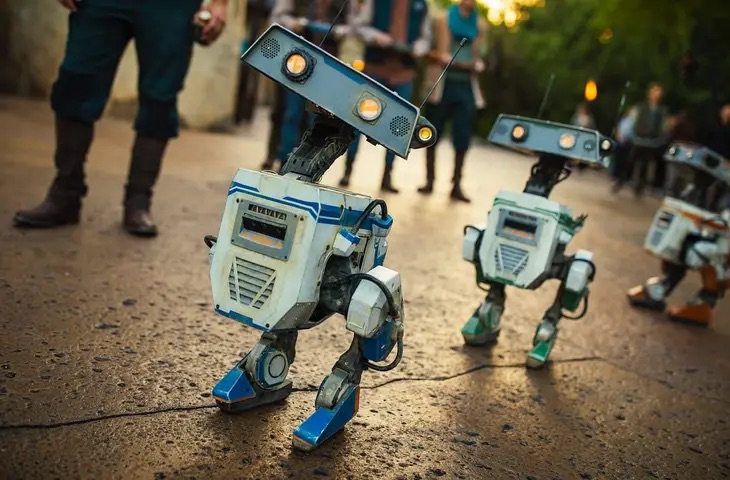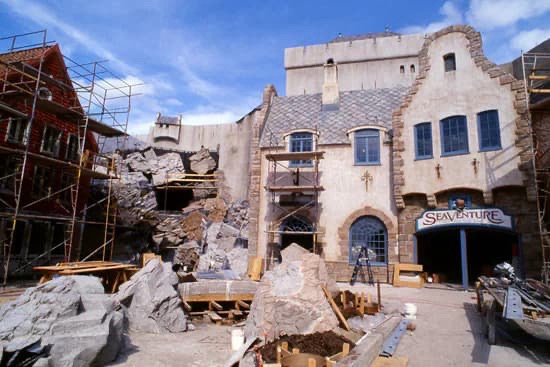Theme parks have long stood as bastions of entertainment, drawing millions each year with their promise of thrilling rides, immersive environments, and captivating characters. As technology evolves, so too do the ways in which these parks engage with their guests. In recent years, Artificial Intelligence (AI) has emerged as a transformative force in the theme park industry, reshaping the visitor experience through personalization, operational efficiency, and groundbreaking innovations. Let’s explore the profound impact of AI on theme parks, examining its role in personalizing guest interactions, enhancing operational efficiency, and setting the stage for future advancements.
Personalized Guest Experiences Through AI
AI’s influence in theme parks is most noticeable in the ways it personalizes and enhances the guest experience. From interactive characters to smart queue systems, AI tailors experiences to individual preferences, making visits more enjoyable and memorable.
1. Interactive Characters
One of the most exciting applications of AI in theme parks is the creation of interactive characters that respond to guests in real-time. Disney, a pioneer in this field, has showcased its advancements in AI-powered robotics at Nvidia’s GTC Artificial Intelligence conference in San Jose. During Nvidia CEO Jensen Huang’s keynote address, Disney’s AI-powered Star Wars robots were highlighted as a key innovation. Developed by Disney Research and Walt Disney Imagineering Research & Development (WDI), these free-roaming robotic characters use Nvidia Jetson robotics computers, enabling them to perform with impressive balance and expressive motions.
These robots learned to walk and interact through NVIDIA Isaac Sim, a robotics simulation platform that allows designers to test and train AI-based robots in a virtual environment. The advanced capabilities of these robots promise to bring a new level of immersion and interactivity to walk-around characters in Disney’s theme parks. Although the exact timeline for their full deployment remains unknown, a playtest held at Disneyland’s Star Wars Galaxy’s Edge in October 2023 showcased these innovations in action.
Disney’s Star Wars robots are just one example of how AI is enhancing character interactions. These robots can engage with guests in meaningful ways, responding to questions, remembering past interactions, and even adapting their behavior based on the guest’s emotional state. Such advancements create a more immersive and personalized experience, making interactions with characters more engaging and memorable.
2. Smart Queues and Itinerary Planning
Long wait times are a common challenge at theme parks, but AI is transforming how parks manage queues and reduce these delays. Disney’s Genie+ utilizes AI to enhance guest experiences by minimizing wait times and optimizing park visits. Building on the FastPass system, Genie+ employs advanced algorithms to offer a dynamic and personalized approach. For a daily fee, guests can access Lightning Lane entrances at selected attractions, bypassing standard standby lines. The AI-driven system continuously analyzes real-time data on wait times, crowd levels, and guest preferences to provide tailored recommendations, ensuring a smoother and more enjoyable visit.
The Genie+ service integrates with the My Disney Experience app, where AI algorithms assist in booking Lightning Lane reservations and offer real-time updates. The app uses machine learning to optimize reservation times and delivers personalized suggestions and notifications based on current park conditions and individual interests. Additionally, the Disney Genie service, which is complimentary, provides AI-driven itinerary planning and personalized recommendations without line-skipping features. Together, these services leverage AI to enhance the park experience, combining sophisticated planning tools with practical solutions for managing wait times and maximizing enjoyment.
3. AI-Powered Ride Experiences
Universal’s new patent, titled “Artificial Intelligence (AI)-assisted and Dynamic Ride Profile Head Tracking Systems and Methods,” marks a major leap in enhancing the interactivity and responsiveness of theme park rides. This groundbreaking patent leverages AI to improve the realism and spontaneity of attractions by dynamically adjusting visual elements based on passenger interactions. By utilizing advanced algorithms such as machine learning and deep learning, the system predicts where a rider’s attention will be focused in real-time, analyzing both historical data and current head or eye position data.

The technology behind this patent includes head-tracking and eye-tracking capabilities to determine where riders are looking at any given moment. This data is then used to adjust the visual and motion elements of the ride to align with the passenger’s focus. As a result, the ride environment responds dynamically to each rider’s movements and attention, creating a more immersive and personalized experience. This innovation reflects Universal’s dedication to using AI to push the boundaries of theme park technology and elevate the guest experience.
For example, imagine you’re on a theme park ride that simulates flying through a magical forest. As you turn your head to the left, the ride’s scenery and special effects shift to show more details on that side, such as a dragon flying by or a glowing fairy. This personalized experience is made possible by the AI system, which tracks your head movements and predicts where you’ll look next. This ensures that the ride feels unique and engaging, tailored specifically to your attention and movements.
Enhancing Operational Efficiency with AI
In addition to personalizing guest experiences, AI plays a crucial role in optimizing theme park operations. By streamlining processes and improving resource management, AI helps parks run more efficiently and cost-effectively.
1. Predictive Maintenance and Safety
AI’s role in predictive maintenance is transforming how theme parks manage their rides and attractions. Traditionally, maintenance schedules were based on fixed intervals or reactive approaches. AI, however, allows for a proactive strategy by analyzing data from ride sensors to predict potential failures before they occur.
For instance, sensors monitor factors such as vibration levels, temperature, and wear and tear, feeding this data into AI algorithms that forecast when components might fail. This approach enhances safety, reduces downtime, and lowers operational costs by preventing unexpected ride closures.
2. Crowd Management
Effective crowd management is essential for a smooth theme park experience, and AI is proving invaluable in this area. AI-driven surveillance systems analyze video feeds to detect areas of congestion and provide real-time recommendations for managing crowd flow. Adjustments such as deploying additional staff, opening extra lanes at food and beverage locations, and modifying the timing of parades and shows help distribute guests more evenly throughout the park.

Mobile apps powered by AI can also provide real-time updates to guests, alerting them to crowded areas and suggesting alternative routes or attractions. This improves guest satisfaction and operational efficiency by ensuring that resources are allocated where they are most needed.
3. Dynamic Pricing and Revenue Optimization
AI enables dynamic pricing strategies that adjust ticket prices based on demand, weather conditions, and other factors. This approach maximizes revenue while managing crowd levels more effectively. AI algorithms analyze historical and real-time data to predict peak and off-peak times, adjusting prices accordingly.
AI also optimizes revenue from in-park spending by analyzing guest behavior and preferences to deliver personalized offers. Recommendations for dining packages, merchandise discounts, and other incentives are tailored to individual guests, increasing the likelihood of additional purchases and enhancing overall profitability.
AI and the Future of Theme Park Entertainment
The future of AI in theme parks promises even more exciting developments, with new technologies set to redefine immersive entertainment.
1. Advanced Robotics and Animatronics
The next generation of animatronics will be powered by AI, leading to more lifelike and interactive characters. Disney’s advancements in AI-driven robotics, as demonstrated at Nvidia’s GTC conference, highlight the potential for creating highly expressive and mobile characters. These robots can move fluidly, exhibit complex facial expressions, and engage in dynamic conversations with guests.
The integration of AI with animatronics will enable characters to remember past interactions, adapt their behavior based on guest preferences, and provide personalized experiences. This level of realism and interactivity will bring new dimensions to theme park attractions.
2. Virtual and Augmented Reality Integration
AI is set to enhance Virtual Reality (VR) and Augmented Reality (AR) experiences in theme parks. AI can create more realistic and personalized VR and AR content, tailoring experiences to individual guests based on their preferences and actions. For example, AI can customize VR adventures, adjust gameplay difficulty, and enhance interactive experiences by integrating virtual characters and objects that respond to guest interactions.
The convergence of AI, VR, and AR will result in immersive experiences where the boundaries between the real and virtual worlds become increasingly blurred.
3. AI-Powered Storytelling
AI-driven storytelling has the potential to revolutionize theme park narratives. AI can create dynamic, personalized stories that adapt to each guest’s choices and actions. Guests could embark on AI-generated quests, interact with characters, solve puzzles, and explore different areas of the park, with the AI tailoring the experience based on their preferences.
This evolving storytelling approach could create a sense of continuity across visits, with guests’ actions influencing future experiences and deepening their engagement with the park’s attractions.
Challenges and Ethical Considerations
As AI becomes more integrated into theme park experiences, it is essential to address the associated challenges and ethical considerations.
1. Data Privacy
The use of AI often involves collecting and analyzing guest data. Ensuring data privacy and security is crucial. Theme parks must be transparent about data collection practices and comply with privacy regulations. Guests should have control over their data, with the option to opt out if desired. Robust cybersecurity measures are necessary to protect sensitive information from breaches.
2. Inclusivity
AI-driven experiences must be designed to be inclusive and accessible to all guests. This includes accommodating guests with disabilities and ensuring that AI interactions are understandable and enjoyable for everyone. Regular audits and updates to AI systems are needed to minimize bias and ensure fair treatment for all guests.
3. Balancing Automation and Human Interaction
While AI enhances theme park experiences, it is important to balance automation with human interaction. Guests visit theme parks for personal connections, whether through interactions with cast members or shared experiences with loved ones. AI should complement, rather than replace, human interactions, allowing cast members to focus on delivering personalized and memorable experiences.
How AI Will Transform Theme Parks and Shape New Career Paths
Artificial Intelligence is set to revolutionize the theme park industry, transforming how parks interact with guests and manage their operations. With AI, parks can offer increasingly personalized experiences, from interactive AI-powered characters to optimized queue management and advanced ride systems. Innovations like Disney’s AI-driven Star Wars robots, highlighted at Nvidia’s GTC conference, showcase the remarkable potential AI has for creating more immersive and engaging entertainment.

As AI technology progresses, theme parks will be able to deliver even more cutting-edge experiences. The combination of AI with robotics, virtual reality (VR), augmented reality (AR), and dynamic storytelling will push the limits of what theme parks can offer. This shift will necessitate a new wave of professionals with expertise in AI development, robotics engineering, data analysis, and immersive technology design. Software engineers, in particular, will play a crucial role in developing and implementing AI systems, ensuring that the technology operates seamlessly and enhances the guest experience.
The future of theme parks, illuminated by AI, promises a new era where each visit is uniquely tailored to the guest. As AI becomes central to themed entertainment, the industry will increasingly seek professionals with skills in AI and software engineering. This evolution will elevate entertainment to unprecedented levels of immersion and personalization, making theme park adventures more magical and memorable than ever before.






